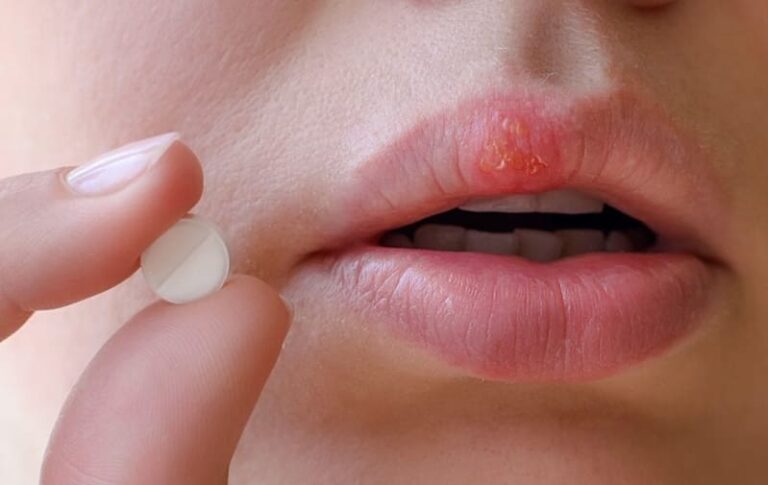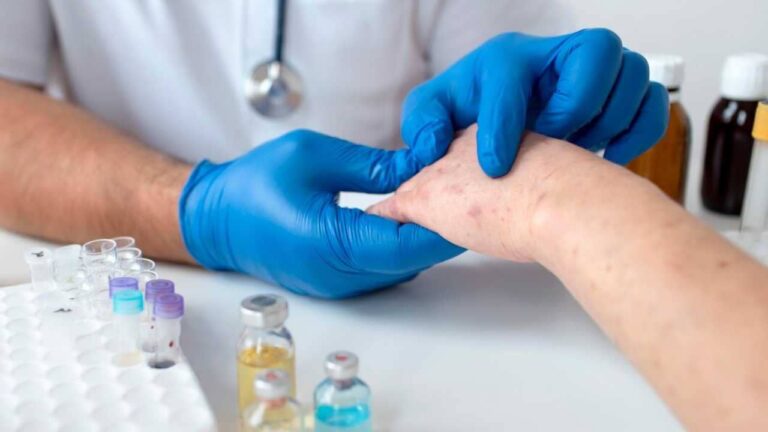Herpes and low immunity, is related to stress, poor diet and lack of sleep that are pillars that harm the immune system. After all, our “soldiers” must also keep themselves in top condition and ready for all combat needs.
In this article, we list 15 signs that may be associated with a weakened immune system and also provide scientific recommendations that together strengthen the body’s defenses.
Know the 15 symptoms that can be related to a weak immune system and herpes.
However, we emphasize that individual symptoms do not require a specific diagnosis, and therefore it is important to consult a doctor for treatment.
1. Psoriasis
Psoriasis is a chronic autoimmune disease that manifests itself as redness and irritation of the skin.
The disease is linked to the immune system, environmental interactions and genetic susceptibility. It is thought to develop when T lymphocytes (cells responsible for protecting the body) clear blood vessels and inflame them.
People whose immune systems are already weakened are at risk for more severe psoriasis flare-ups.
2. Anemia
Research shows that iron plays an important role in the immune system. It is responsible for the proliferation of immune cells, mainly lymphocytes, which are involved in the development of a specific response to infection. As a result, anemia can be a warning sign of a weak immune system.
Results of a study on infants published in The Lancet show that when hemoglobin levels fall to 10 g/dL or less, both the cell-mediated immune response and the bactericidal activity of leukocytes decrease.
3. Diabetes
Research shows that diabetes causes the immune system to malfunction because it cannot control the spread of invading pathogens, as too much glucose can damage the immune system.
Diabetes is not synonymous with low immunity, but it is known that diabetics are more prone to infections.
4. Weakness
Feeling extremely tired even after resting could be a sign that something is going on with the body’s defenses.
As we explained earlier, a symptom cannot lead to a specific diagnosis, as weakness is associated with several pathologies. Consult your doctor and never make a self-diagnosis.
5. Cold
The common cold is a common viral infection that can be caused by many different viruses. In people with a strong immune system, this condition is not particularly dangerous and the symptoms last for 2-3 days.
However, people with low immunity can face serious complications as a person can develop bacterial infections in addition to the usual symptoms like runny nose and loss of appetite.
6. Herpes
Herpes virus infections are usually caused by direct contact with infected oral secretions or wounds. Research shows that the virus defeats the immune system by interfering with the process by which immune cells recognize and destroy foreign invaders.
After the first (primary) infection, the herpes virus remains dormant (latent) in the body, but if our immune system is in a negative state, it can reappear.
Therefore, herpes may indicate weak immunity.
7. Excessive Hair Loss
When the immune system is strengthened, the hair becomes shinier and stronger. However, if immunity is low, it is common for the wires to fall.
8. Common dry eyes
People with autoimmune diseases such as rheumatoid arthritis and lupus can experience blurred vision and often dry eyes.
We emphasize again the importance of consulting a doctor, as a symptom cannot be used for diagnostic purposes.
9. Constipation
Nearly 70 percent of your immune system resides in your digestive system.
Thus, persistent constipation may indicate a possible deficiency of the immune system, as it slows down peristaltic activity. This means food and waste get trapped, preventing the absorption of important nutrients, some of which are needed to support the immune system.
10. Diarrhea
People with weak immunity may also have frequent diarrhea. After all, if the good bacteria in your gut are depleted by diarrhea, you’re likely to compromise your immune system.
11. Fever
Fever is a phenomenon of the body’s defenses, which can indicate several diseases. According to WebMD, a leading health portal, a higher-than-normal body temperature could indicate that your immune system is in overdrive.
12. Cold Extremities
The portal also shows that fingers, toes, ears and nose can get cold when blood vessels are inflamed. Such a condition can occur as a result of a severely weakened immune system.
13. Migraine
The immune system plays a key role in the pathogenesis of survival. maintaining elements of the immune system has been found to be a promising area for the development of new headache remedies.
14. Problems with Wound Healing
Skin goes into damage control mode after a burn, cut, or scratch. In this way, the body protects the wound and sends nutrient-rich blood to the damaged area so that the new skin can regenerate.
This healing process is based on healthy immune cells. However, when the immune system is compromised, it is more difficult for the skin to heal.
15. Continued use of Antibiotics
Do you often use antibiotics? According to the American Academy of Allergy, Asthma and Immunology, needing more than two antibiotics per year may be a sign of possible immunodeficiency in adults.
What to do to Increase our Body’s Immunity?
Here’s what we know so far: for our entire body to function properly, the immune system must always be ready to protect us from aggression. The first step in this direction is healthy eating. Thus, nutrients are essential for the reproduction and full functioning of immune cells.
Things that harm the body should also be avoided. These good healthy living habits make all the difference:
1. Do not smoke;
2. Maintain an adequate body weight;
3. Avoid the use of alcoholic beverages.
In addition, maintaining a proper routine is also important, including activities such as:
- Exercise regularly;
- Sleep well;
- For the prevention of infectious diseases and infectious diseases;
- Moments of relaxation and a break from news and social networks.
Foods that Strengthen Immunity and Benefits for Herpes Treatment
The intestine regulates up to 70% of the body’s immune function, and it is no coincidence that correcting the imbalance of the bacterial flora, according to recent studies, has improved the condition of many pathologies.
Thus, nutrition is closely related to the immunity of the body.
Some foods that help boost immunity include:
1. Fruits like orange, lemon, acerola, strawberry;
2. Garlic;
3. Extra virgin olive oil;
4. Saffron/turmeric;
5. Red-haired;
6. Propolis.




